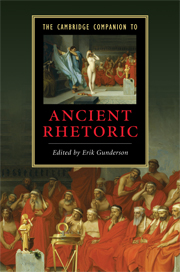Book contents
- Frontmatter
- Introduction
- Part 1 An archaeology of rhetoric
- Part II The field of language
- 4 Divisions of speech
- 5 Rhetoric, aesthetics, and the voice
- 6 The rhetoric of rhetorical theory
- 7 The politics of rhetorical education
- Part III The practice of rhetoric
- Part IV Epilogoues
- Appendix 1: Rhetorical terms
- Appendix 2: Authors and prominent individuals
- References
- Index of passages
- Index of subjects
- Series list
5 - Rhetoric, aesthetics, and the voice
from Part II - The field of language
Published online by Cambridge University Press: 28 January 2010
- Frontmatter
- Introduction
- Part 1 An archaeology of rhetoric
- Part II The field of language
- 4 Divisions of speech
- 5 Rhetoric, aesthetics, and the voice
- 6 The rhetoric of rhetorical theory
- 7 The politics of rhetorical education
- Part III The practice of rhetoric
- Part IV Epilogoues
- Appendix 1: Rhetorical terms
- Appendix 2: Authors and prominent individuals
- References
- Index of passages
- Index of subjects
- Series list
Summary
The voice is speaking, but the speaker is reading.
(Susan Stewart)The history of rhetoric in three easy lessons
In the eighth book of his Lives of the Philosophers, Diogenes Laertius relates an anecdote about Pythagoras in the light of which Pythagoras seems to have perfected if not the art of rhetoric, then at least its essence. The account is of a most unusual rite of passage. According to Diogenes, and the story is repeated by Iamblichus in his own Life of Pythagoras, Pythagoras used to lecture for long periods to his pupils, whether hidden behind a curtain or lecturing only at night in utter darkness (Diogenes Laertius 8.15; Iamblicus, Life of Pythagoras 72). “For five years [his disciples] would keep silent, merely listening to his speeches without seeing him, until they passed a test. From that point on they were allowed into his house and were able to see him” (Diogenes Laertius 8.10). How many speakers in antiquity (or at any time) could hold an audience captive like this for an evening, let alone for five years? To be sure, Pythagoras was not an orator and his lectures were not oratory. But he grasped a fact about rhetoric that would define it for centuries to come: rhetoric was the art of managing the voice.
Nevertheless, it was not Pythagoras but rather two figures from epic, Nestor and Odysseus, who would come to embody the spirit of rhetoric in the ancient imaginary, albeit in two distinct ways. Nestor, the elder statesman of the Homeric Greeks, was endowed with a mellifluous tongue and the gift of gab: he was the embodiment of persuasion. His sagacity was announced by his solemnity, his gait, and his age. Once he opened his lips, this physical impression was confirmed. Odysseus, by contrast, was the master of deception, though you would never guess this from the way he looked. Outwardly unheroic, small in stature, even ungainly, he also seemed idiotic and incapable of speech.
- Type
- Chapter
- Information
- The Cambridge Companion to Ancient Rhetoric , pp. 92 - 108Publisher: Cambridge University PressPrint publication year: 2009
- 2
- Cited by

